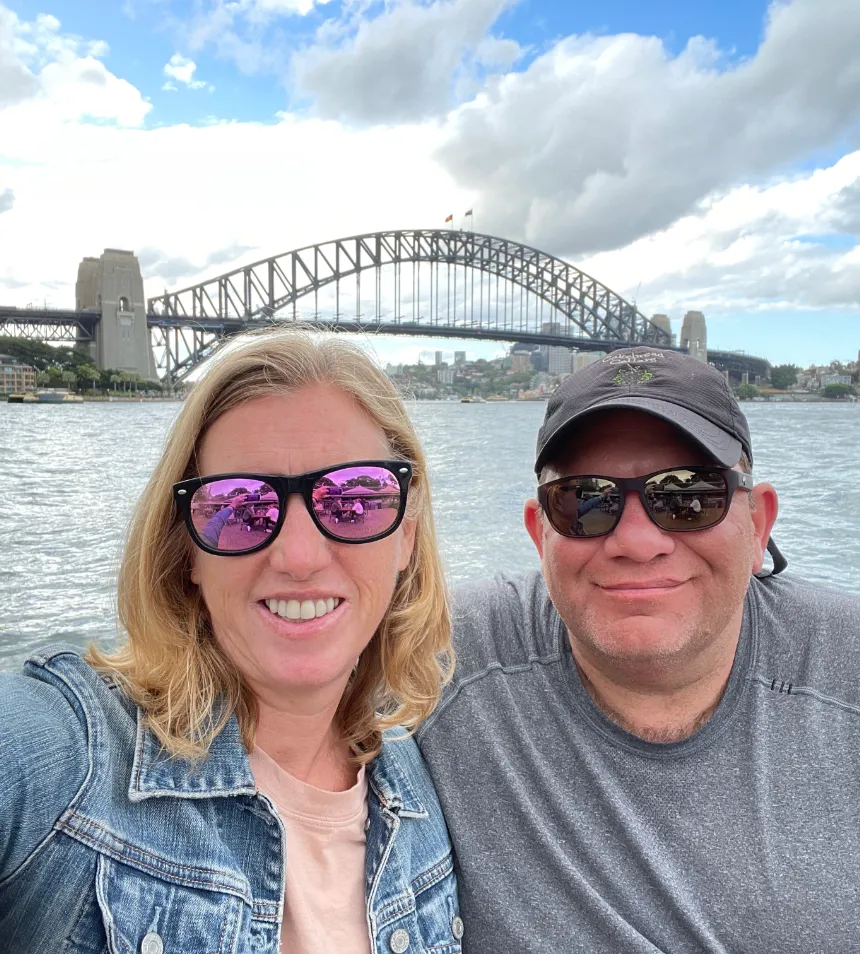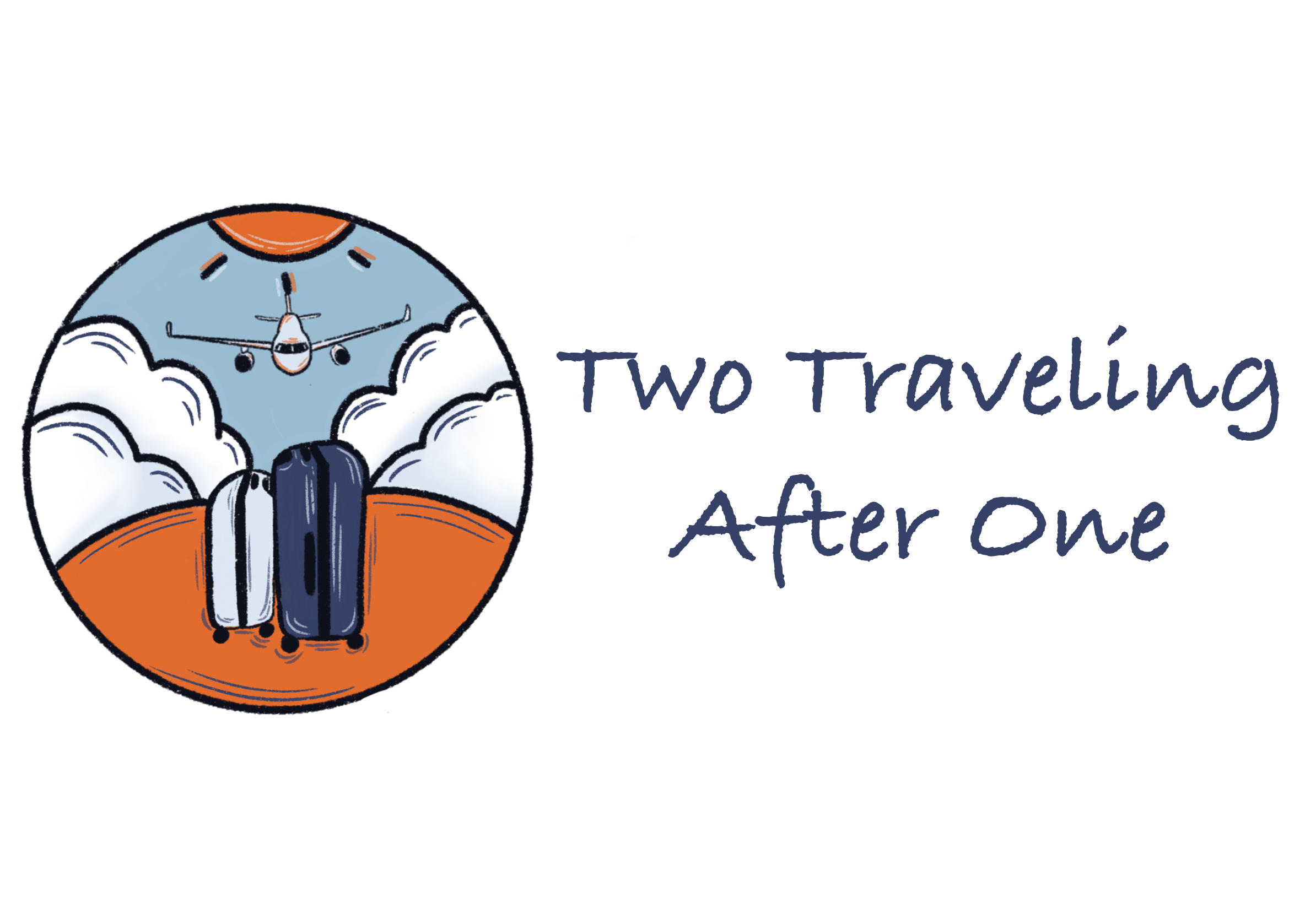Volunteering While Traveling: What We’ve Learned as Slow Nomadic Travelers
One of the greatest joys we’ve discovered since embracing our nomadic lifestyle is the opportunity to give back, not with money, but with our time and presence. Let’s face it, we’re too busy exploring the world to carry around that kind of extra cash. This being said, Volunteer Travel has become a cornerstone of our journey, enriching our travels and deepening our connections with the places and people we encounter, and, now and then, scoring us front-row seats to concerts we never expected when we first signed up to hand out water cups.
The Roles We Play
As volunteer ushers, coordinators, and water station assistants, we’ve learned that giving away our precious time opens the door to VIP cultural experiences we could never have imagined. Most recently, we had the honor (or perhaps the “glorified job” title works better) of volunteering at events featuring legends like David Sedaris, Amy Schumer, Graham Nash, Sara Bareilles, and even Dave Matthews’ final spring performance in Florence, Italy. Alongside these big-name shows, we’ve also experienced meaningful cultural events such as the “Possible Dreams Auction” and “The Chilmark Book Festival.” These gigs haven’t just given us access to unforgettable events, they’ve connected us with fellow travelers and locals, helping our sense of community thrive, even when we’re simply passing out programs.
The Tools We Use
In our travels, we’ve discovered a wealth of platforms that allow us to offer help in exchange for lodging, meals, or event access. From festival work to supporting local nonprofits, we’ve had the chance to immerse ourselves in each destination truly. Whether it’s staying with a local family in exchange for washing a few dishes (don’t worry, we’ve mastered the art of smiling through it) or assisting behind the scenes at a concert, volunteering has become an invaluable way to enhance our journey while staying true to our values of cultural exchange and community.
For us, it’s not just about ticking off new destinations, it’s about fully experiencing them. And as our whirlwind adventure continues, we’re excited to explore more opportunities to give back, volunteer, and create meaningful connections with the world around us, all while hoping for a front-row seat.
QUICK NOTE: This post contains affiliate links and Two Traveling After One may receive a commission for purchases made through these links, at no extra cost to you.
Table of Contents
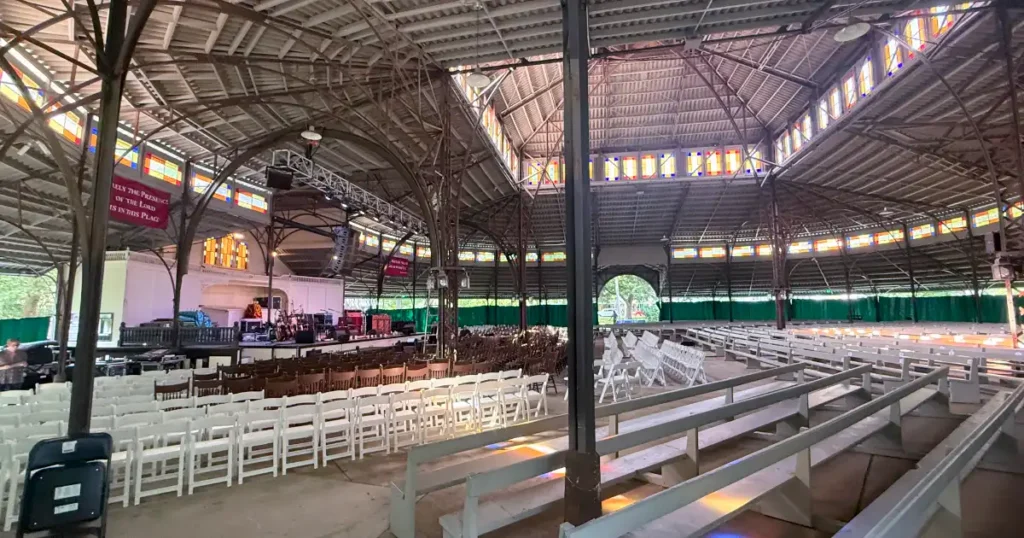
Festival & Concert-Based Volunteer Travel
REVERB places volunteers like us at concerts and festivals. Volunteers may assist with environmental campaigns, water stations, or waste reduction initiatives, and often get free concert access in return, making it a powerful fit for traveling music lovers who care about climate impact. The picture above is from a Dave Matthews Band Show we recently attended in Florence, Italy. Dave Matthews Band is one of many bands leveraging the platform, and for those groupies looking to follow their favorite acts around the world, here is your chance.
We found that specific festivals like Telluride Film Festival (via SHOWCORPS) and Farm Aid frequently offer passes, merch, and social event access in return for shift commitments (Telluride typically requires ~30 hours of work). Download Festival (UK) and others replicate this model, more regionally, depending on the destination. Many of these opportunities are published on the festival’s own “Volunteer” or “Get Involved” web pages.
Boomerang (a platform we recently used) also connects volunteers with arts and cultural events across the U.S., typically returning free or discounted access, making it perfect for empty nesters, retired travelers, or seniors traveling with flexible time.

English Conversation Immersion Programs
Another unique volunteer travel opportunity for slow nomads and retirees is participating in English conversation immersion programs. These aren’t formal teaching jobs—there’s no need for lesson plans or a teaching certificate. Instead, you’ll spend several days living alongside local professionals in countries such as Spain, Germany, or Poland, helping them improve their English through natural conversation.
How It Works
Participants are typically businesspeople, students, or professionals eager to practice English in a real-world setting. As a native or fluent English speaker, your “job” is to talk with them—in one-on-one sessions, group activities, over meals, and during evening socials. The programs are carefully structured so everyone gets equal time speaking and listening.
In return, you receive free accommodation and meals for the duration of the program—often in beautiful countryside hotels, historic villages, or boutique resorts. You cover your own travel to the meeting point, and the program handles the rest.
Why It’s Great For Slow Travelers
Cultural Immersion – You’ll spend hours each day in deep conversation with locals, learning about their lives and culture in a way that typical tourism can’t match.
Cost Savings – Lodging and meals are covered, making it an excellent budget-friendly experience.
Social Connection – You’ll form friendships with both locals and fellow volunteers from around the world.
Program Examples
VaughanTown (Spain) – A week-long English immersion retreat in rural Spanish villages.
Diverbo (Spain & Germany) – Combines structured language sessions with cultural activities.
Angloville (Poland, Hungary, Romania, and more) – Short-term programs with flexible schedules across Europe.
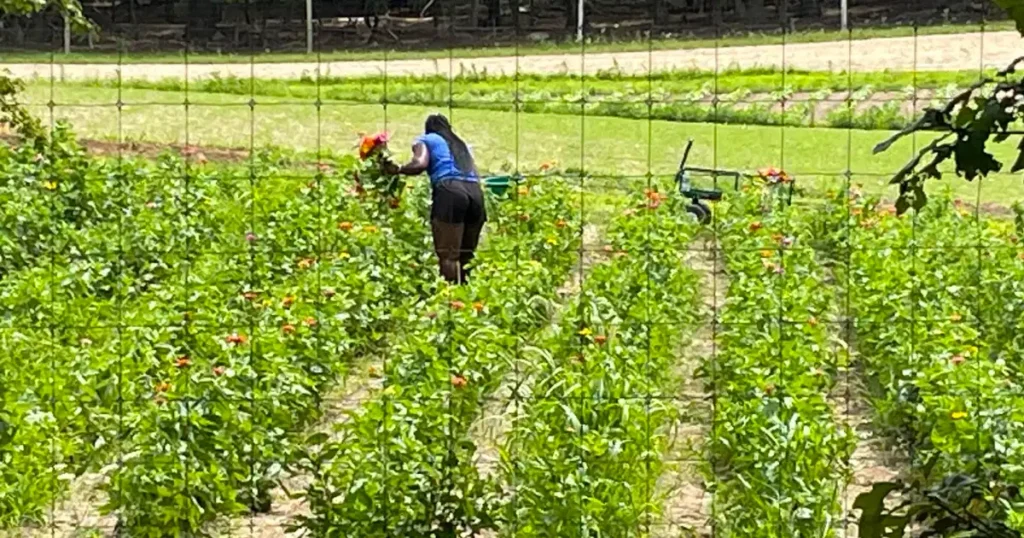
Work-Exchange Platforms for Cultural Immersion
Workaway and HelpX are honest and qualified options, but Worldpackers, which remains our top pick for hosts offering light work, gardening, cooking, language support, and pet care, in exchange for food and lodging. Workaway has over 50,000 hosts worldwide and a strong community infrastructure, though some travelers warn about less-transparent negative reviews and visa ambiguity risks.
Worldpackers has emerged as a more polished alternative in our conversations beyond our own experiences, based on their verified hosts, a stronger support system (including relocation assistance if issues arise), a focus on eco and social-impact opportunities, and high social trust ratings from fellow nomads.
HelpX offers a broader, older-style community of farm or home stays, with variable screening standards and a come-as-is approach. We have not personally used this service, but in the interest of full disclosure, we wanted to include all qualified options.
For those seeking a non-profit hospitality exchange, BeWelcome, Couchers, and Warm Showers serve niche needs (e.g., cyclists, Couchsurfing alternatives), offering free lodging with no financial exchange, though perks beyond a bed or meals may be limited. We’ve made great new friends in Perth, Australia, who are members of Couchers and invited us to stay with them when we visit soon.
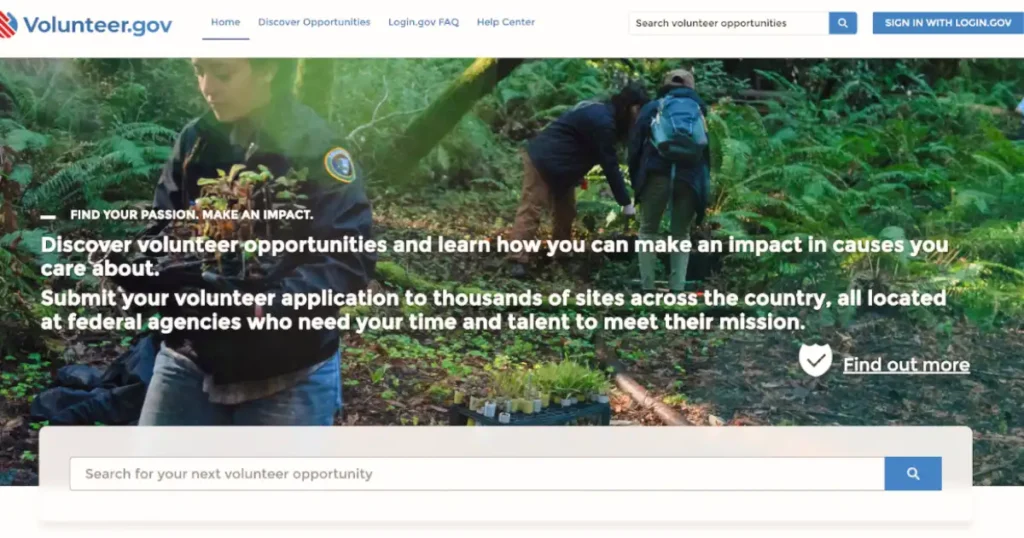
Local & Virtual Volunteer Directories
Our slow travel focus limits our time in the U.S.. Still, we know that many of you are laser-focused on the U.S. So we wanted to share these opportunities based in the United States or nearby travelers. Programs like VolunteerMatch and Volunteer.gov offer curated lists of local in‑community opportunities, from national parks to community events, which can pair nicely with nomadic stays. One Brick features short (3–4 hour) social volunteer gigs with built‑in mixer events and is ideal for blending service with socializing. Regional platforms like BranfordVolunteers.org provide local match-making for those geographically near Connecticut.
These platforms are great for arming your itinerary with flexible-day volunteering or pop-up events, beneficial when you find yourself in major U.S. cities or national forests, parks, or conservation sites.
Do you want to learn more about this lifestyle, including what we pack?
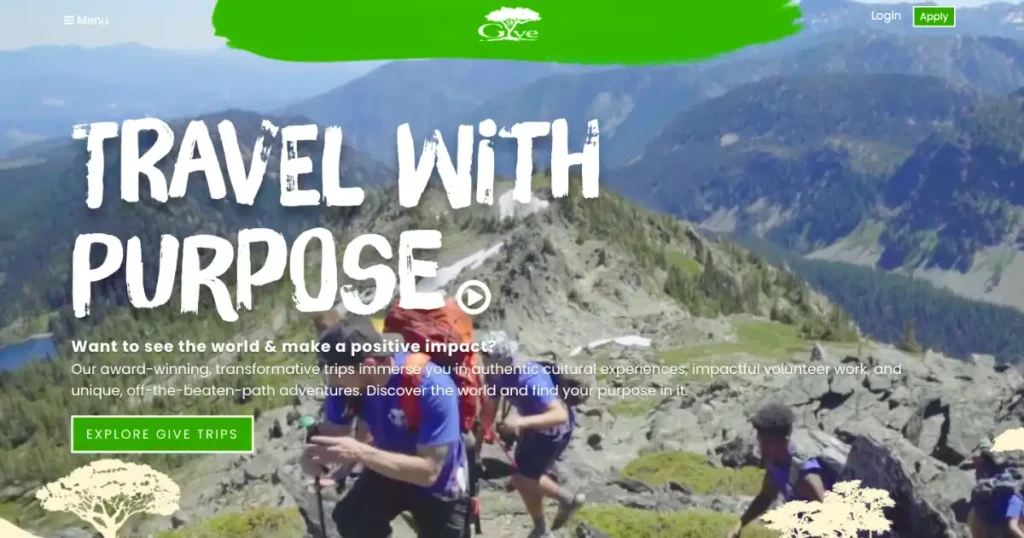
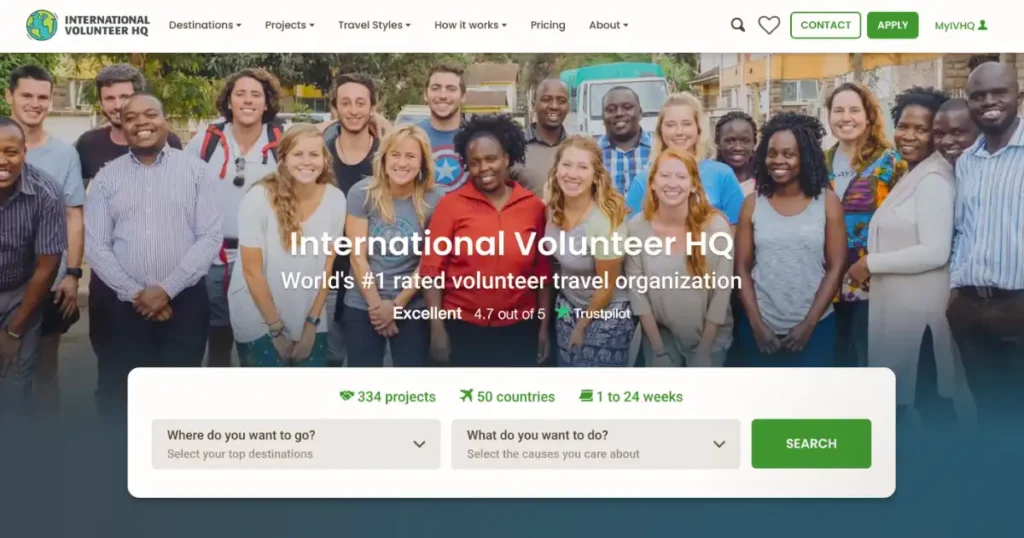
Structured Global Travel Volunteer Programs
If you’re looking for longer-term, project-focused volunteer experiences like we are, platforms like International Volunteer HQ (IVHQ), Volunteer World, GIVE Volunteers, and United Nations Volunteers offer placements ranging from one-week local community projects to multi-week global service work that includes orientation, lodging, meals, and cultural experiences. These opportunities tend to have program fees, but they offer deep immersion, local partnership networks, and strong logistical support.
Volunteering abroad can feel intimidating, especially when you’re not sure what to expect or how much it will cost. We know? It’s natural to feel some apprehension when committing time and money to a program far from home; we certainly do our homework. But the benefits we have found often outweigh the concerns, and we’ve learned that these structured programs provide an opportunity to make a difference while also enriching your travel experience. Here’s a breakdown of what you can expect, financially and otherwise, so you can approach these opportunities with more clarity:
- Program Fees: These fees cover administrative costs, project coordination, and logistical support, typically ranging from $200 to $1,500 per week, depending on the destination and the duration of the project. It might seem like a big commitment upfront, but these fees help ensure you’re fully supported during your time abroad, and not having to worry about the logistics of it all, making it easier to focus on the work you’re there to do.
- Accommodation: Many programs include accommodation, but the type can vary. You may stay in a homestay, volunteer house, or even a hostel. Accommodation fees are typically included in the program cost, though sometimes you’ll need to pay an additional $100 to $500 per month, depending on the program and location. It’s worth asking about these details ahead of time so you aren’t caught off guard.
- Meals: Some programs provide meals as part of the package, especially in remote areas. If meals aren’t included, you’ll likely need to budget around $5 to $15 per day for food. While it might seem like a lot, it’s often cheaper than eating out on your own—and it gives you the chance to try local cuisine!
- Orientation and Support: Most programs include an orientation to help you get acclimated, which is usually covered by the program fees. However, if there are specialized training sessions or pre-departure services, they could come with an additional cost. This support is invaluable, as it helps ease the transition into a new environment.
- Insurance: Many programs require or offer volunteer insurance, which is often included in the fees. This can range from $50 to $150 per month, depending on the level of coverage and the destination. It might seem like an added expense, but if you haven’t already acquired travel or international health insurance, it’s crucial for peace of mind, knowing you’re covered in case of illness or injury while volunteering abroad.
- Travel Costs: While not covered by the program fees, you’ll also need to factor in travel expenses such as flights, visas, and additional travel insurance. These costs can range in a significant way, depending on where you’re coming from and how long you’re staying. These might seem overwhelming at first, but keep in mind that the experiences and reduced cost of living make it all worthwhile.
- Miscellaneous Fees: Some programs have extra costs for optional activities such as weekend trips, language courses, or excursions. These activities often enhance your experience, but they’re not mandatory. Be sure to ask about these fees so you can plan accordingly, especially if these offerings are at a better price point than what you may already be considering.
It’s understandable to feel some hesitation when it comes to committing to a program like this, but volunteering abroad is more than just giving; it’s about building relationships, gaining new perspectives, and immersing yourself in the world in a way that’s both meaningful and enriching. These structured programs provide the logistics and support to help you focus on the work you’re there to do, and often make the difference between a good experience and a great one.

How to Begin Your Volunteer Journey
How to Begin Your Volunteer Journey
- Decide your vibe – Do you want concerts, film festivals, farm stays, community fairs, or cultural events?
- Plan ahead – Major events often open volunteer applications months in advance.
- Check requirements – Understand estimated shift hours, perks, and eligibility (e.g., age, physical ability).
- Stay visa-savvy – Platforms often caution about visa rules; don’t mention “work” at border crossings unless you have the correct visa. Some nomads have encountered serious issues doing otherwise.
- Be flexible – Hospitality platforms may lead to unexpected event invites; community platforms can open new opportunities. We were hired as “Volunteer Coordinators” and received a wage beyond simple access, and this occurred directly through the platform based on our profiles and backgrounds.
Document and reflect – Not only to share but to internalize how giving feels when immersing yourself in these experiences and traveling lightly. We share these experiences whenever we are allowed, on Facebook, YouTube, and other social media platforms.

Why This Works for Slow‑Travelers Like Us
- Budget-friendly: Exchanging time for lodging or access saves travel costs, often significantly.
- Deep connection: Living with a host or volunteering behind the scenes lets you see communities beyond tourist facades.
- Meaningful stories: Every volunteer shift becomes part of a richer travel narrative and helps build social impact.
- Social benefits: Volunteering with festivals, farms, or nonprofits introduces you to locals and fellow volunteers on a genuine level.

What to Watch Out For
- Uneven experience on platforms like Workaway; hosts and volunteers may occasionally misrepresent expectations. Workaway hides one-star reviews, so it’s wise to read multiple accounts and choose carefully. We considered not including this as a resource, but others have also shared very positive experiences.
- Visa ambiguity: Some volunteer exchanges can be considered “work” at immigration checkpoints. Platforms like Workaway note that visa responsibility lies with the traveler; others have more guidance or support. From what we have found, it’s best to refer to your visit solely as tourism to avoid any issues
- Support level varies; Worldpackers tends to offer better customer support and relocation help compared to Workaway or HelpX.

Where We’ve Been & What We’ve Loved
We’ve volunteered with REVERB at a concert tour stop, we helped as ushers at Dave Matthews Band, and worked at the water station (hydrating fans, reducing single-use plastic), and got to enjoy the show from great seats, right upfront. The satisfaction of working on local initiatives while listening to live music was a highlight of our nomadic journey.
On a recent occasion, we used Boomerang to volunteer at a small theater event on Martha’s Vineyard, helping usher and acting as a volunteer coordinator in exchange for tickets. It was fun, spontaneous, and deeply rooted in community arts.
Through Worldpackers, we stayed at a permaculture farm in New Zealand, contributing to garden maintenance and family life. In return, we got meals, lodging, and even an invitation to a local celebration, just slow travel at its best.

Final Thoughts, Tips & Call To Action
Volunteering as a traveler doesn’t just save money; it deepens our travels and helps us leave a footprint of goodwill. For empty‑nesters, seniors, and those living slow‑travel lifestyles, these opportunities are perfect:
- Bring enthusiasm, openness, and gratitude, not just your labor.
- Choose platforms based on the level of support and vetting required.
- Prioritize experiences, such as free lodging, festival access, or cultural exchange, as the real perks.
- Stay aware of legal implications and best practices.
Ready to weave volunteering into your travel life? We’re putting together a downloadable guide soon with a list of upcoming events, platform sign‑up links, visa tips, and our favorite personal stories. Follow us on FaceBook, Subscribe to our YouTube Content and Subscribe to our newsletter so that you are the first to know and don’t miss a thing.
Volunteer Travel for Retired Travelers, Empty Nesters & Senior Nomads – FAQ
What is volunteer travel for retired travelers and senior nomads?
Volunteer travel is when retired travelers, empty nesters, or senior nomads exchange their time, skills, and life experience for lodging, meals, event access, or cultural immersion while exploring the world. Instead of paying for accommodation, you contribute through tasks such as gardening, teaching English, ushering at festivals, or supporting nonprofit projects.
How can volunteering help retired travelers save money on the road?
Volunteer travel can dramatically lower your travel costs by providing free lodging, meals, or tickets to cultural events in exchange for your time. This is especially valuable for retirees or empty nesters traveling long-term, as it allows you to stretch your budget while experiencing destinations more deeply.
What are the best volunteer platforms for senior nomads?
Volunteer travel platforms include:
- Workaway – 50,000+ hosts worldwide, ideal for homestays and cultural immersion.
- Worldpackers – Verified hosts, eco and social-impact focus, strong traveler support.
- HelpX – Farm stays and homestays for flexible travelers.
- Boomerang – Connects you with arts, music, and cultural events.
- REVERB – Environmental volunteering at concerts and festivals.
Are there volunteer travel opportunities for festivals and cultural events?
Yes. Platforms like REVERB connect volunteers to concerts and festivals where you might help with environmental initiatives, water stations, or guest services. Many festivals, like Telluride Film Festival or Farm Aid, offer free passes, behind-the-scenes access, and social events in exchange for volunteer shifts..
Do I need special skills to volunteer while traveling?
Not always. Many roles are perfect for retirees and empty nesters with no prior experience, such as light gardening, helping with guest check-ins, or ushering. That said, skills in teaching, hospitality, event coordination, or languages can open doors to more unique opportunities.
Is there an age limit for volunteer travel?
Most volunteer travel programs welcome people of all ages. Many hosts and event organizers appreciate the reliability, experience, and interpersonal skills that retired travelers and senior nomads bring.
How can I find volunteer opportunities during my travels?
Use local and global directories:
- VolunteerMatch and Volunteer.gov – Community events, park programs, and conservation projects in the U.S.
- One Brick – Short, social volunteer gigs with built-in mixer events.
- Boomerang – Arts and culture events across the U.S.
Festival websites often have a “Volunteer” or “Get Involved” section with open applications.
Do I need a special visa to volunteer abroad?
It depends on the country. Some volunteer roles may be considered “work” by immigration officials. Always check visa requirements before you apply, and avoid using the word “work” at immigration unless you have the correct visa. Many retired travelers opt for tourist visas when doing light cultural exchange.
Is volunteer travel a good fit for slow travel lifestyles?
Yes, volunteer travel is perfect for slow travel. It allows you to stay longer in one place, live like a local, build relationships, and create meaningful memories. For senior nomads, it’s a budget-friendly way to make your travel more immersive and purposeful.Lorem ipsum dolor sit amet, consectetur adipiscing elit. Ut elit tellus, luctus nec ullamcorper mattis, pulvinar dapibus leo.
What should retirees watch out for when choosing a volunteer program?
- Vet your host – Read reviews carefully and communicate directly before committing.
- Clarify expectations – Know the hours, tasks, and benefits upfront.
- Choose supportive platforms – Services like Worldpackers offer relocation assistance if needed.
- Stay flexible – The best experiences often come from unexpected opportunities.


